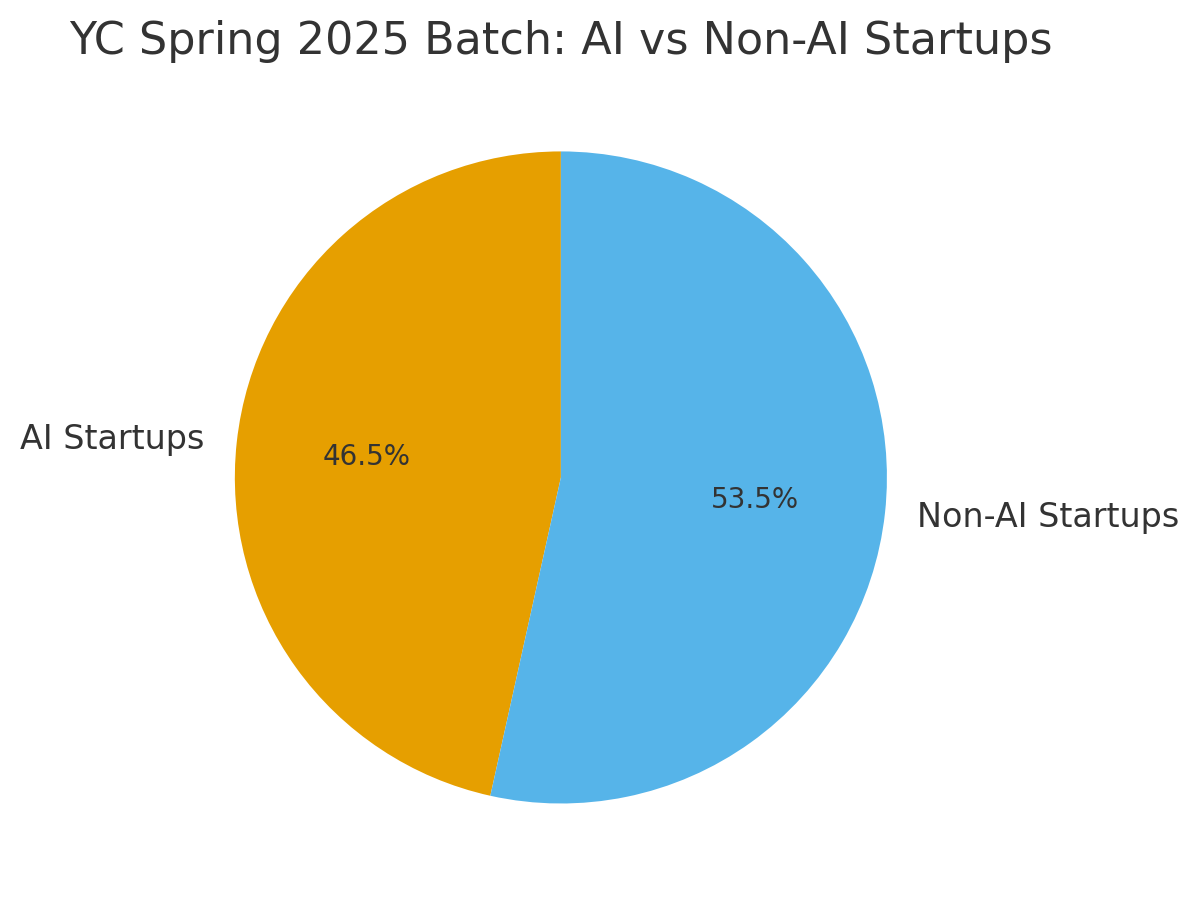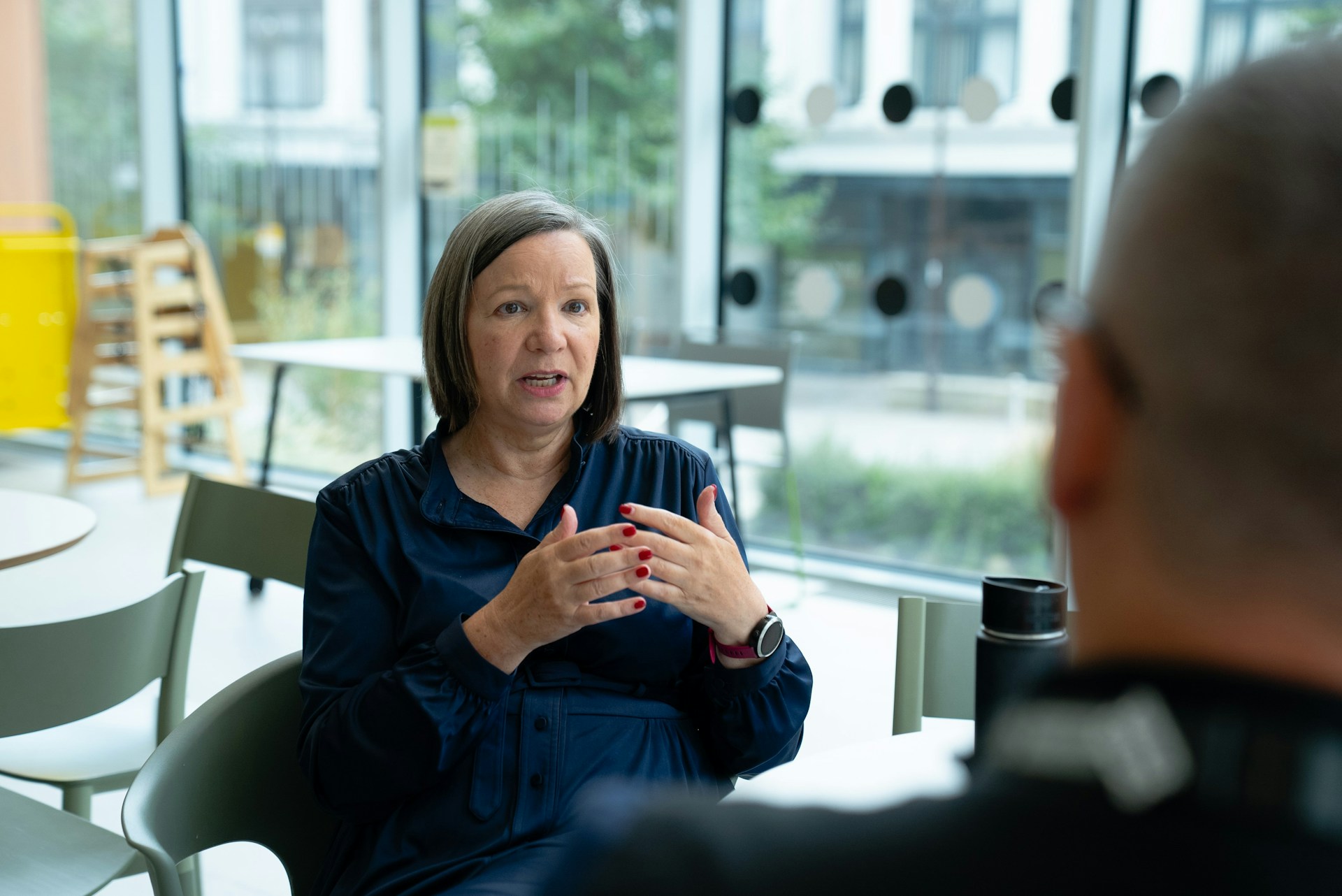Why the Next Big Startup Wave Must Go Beyond AI: The Case for Non-AI Innovation

The startup ecosystem has been hijacked by artificial intelligence. Accelerators are filled with AI agents, investors chase the next breakthrough model, and media coverage makes AI seem like the only frontier worth pursuing. The pace of AI adoption is staggering: within a single year, hundreds of new startups have launched products branded as “AI-powered,” ranging from productivity assistants to industry-specific automation tools.
Yet beneath the surface, this overwhelming focus raises important concerns. When half of the new companies in a major accelerator are working on roughly the same type of technology, it suggests an unhealthy imbalance. True innovation requires breadth as well as depth, and narrowing the startup ecosystem to a single trend can leave large swaths of the economy underserved. This article examines the recent wave of AI-heavy startups, explains why founders are so drawn to AI, and makes the case for why non-AI startups are still urgently needed.
The Numbers: How Many Startups Are Really About AI?
Recent data demonstrates how dominant AI has become. The Y Combinator Spring 2025 batch featured 144 companies, and 67 of them — nearly half — were centered on building AI agents. The rest spanned categories such as commerce, fintech, healthcare, and hardware, but even many of those incorporated AI in supporting roles, such as analytics or customer support.
Coverage from TechCrunch highlighted 11 companies from YC’s demo day. Of those, eight or nine were AI-first, ranging from enterprise automation tools to industry-specific copilots. Only two or three companies were not primarily AI-based, such as Atum Works, which develops 3D semiconductors.
Meanwhile, “startups to watch” lists from Startup Savant show a similar pattern. Companies like Whatnot, Maisonette, and Spring Labs succeed without AI as their foundation, yet many of the others spotlighted lean heavily on artificial intelligence.
To visualize the distribution in YC’s Spring 2025 batch, here’s a breakdown of AI versus non-AI startups:

Why Founders Gravitate Toward AI
The first reason is scalability.
AI offers the promise of building once and selling infinitely. A single model, once fine-tuned, can provide value across industries, user groups, and even languages. Unlike businesses that depend on physical goods or human-intensive services, AI startups appeal to founders because they can scale rapidly without proportional increases in cost.
Second, investor enthusiasm fuels the trend.
Pitching an AI startup today signals alignment with venture capital priorities. Founders know that venture capitalists are seeking exposure to AI, and accelerators like YC reinforce this by filling their batches with agent-driven projects. This creates a feedback loop: founders pitch AI to attract funding, and funding availability draws even more founders into AI.
Third, barriers to entry are lower than in previous technological waves.
The open-source release of large language models, combined with powerful APIs from companies like OpenAI and Anthropic, allows a small team to launch a functional AI prototype in weeks. Founders who once needed deep technical expertise can now integrate pre-trained models into niche applications.
Finally, cultural and psychological forces are at play.
AI dominates news headlines and social media, creating a fear of missing out. Founders worry that if they don’t build in AI now, they’ll be left behind when the technology matures. This urgency, whether rational or not, pushes more entrepreneurs into the AI space even if their expertise lies elsewhere.
Why Founders Must Look Beyond AI
Despite the appeal, the AI gold rush has limits. Markets quickly saturate with nearly indistinguishable products. Already, multiple startups are competing to build “AI assistants for lawyers,” “AI copilots for doctors,” and “AI-driven customer support.” The differentiation between them is often minimal, which pressures companies to compete on price rather than value.
AI startups also face structural challenges. The costs of running large models remain high, particularly as customer demand scales. Many companies rely on APIs from third-party providers, which introduces fragility: if pricing changes, if latency increases, or if a provider shuts down access, entire business models collapse. There are also growing risks around regulation, privacy, and liability. Governments worldwide are drafting rules to monitor and control the use of AI, and startups without the resources to navigate compliance may be caught in the crossfire.
Equally important, not all problems need AI. The world’s most pressing challenges — affordable housing, renewable energy, logistics bottlenecks, water security, require physical products, better supply chains, or smarter policies. While AI can enhance these efforts, it is rarely the core solution. Startups focused exclusively on AI risk neglecting vast opportunities in industries where innovation has stagnated.
Another reason to diversify is resilience. An ecosystem dominated by one technology becomes vulnerable to shocks. If regulatory changes make AI harder to deploy or if public trust erodes due to misuse, an over-reliance on AI-focused startups could leave investors, accelerators, and founders exposed. Non-AI startups, by contrast, provide balance and stability.
Why Non-AI Innovation Matters Today
Non-AI startups are not just “alternatives” to AI ventures; they are essential to the long-term health of the innovation ecosystem. They matter for three reasons.
First, they bring balance.
Concentrating resources and talent exclusively on AI risks ignoring equally large markets. Commerce, logistics, manufacturing, and energy all offer trillion-dollar opportunities, and leaving them untouched slows progress.
Second, they provide foundational support.
AI companies cannot thrive without infrastructure like chips, data pipelines, and energy systems. Non-AI innovation often builds the platforms on which AI advances depend. For example, Atum Works’ semiconductor breakthroughs or Spring Labs’ trust systems create the conditions that allow AI companies to scale securely and efficiently.
Third, they address pressing global needs.
Climate change, healthcare accessibility, supply chain resilience, and affordable housing will define the next decades. AI may play a role, but these problems also require material science, clean energy solutions, regulatory innovation, and new business models. Non-AI startups are often the ones willing to tackle these hard, less glamorous challenges.
Non-AI Startups That Are Thriving
Even amid the AI frenzy, several non-AI startups are proving that alternative paths can lead to success.
Whatnot has built a thriving livestream shopping marketplace for collectibles. It leverages cultural trends and community-driven commerce rather than AI algorithms as its foundation.
Maisonette curates a marketplace for children’s goods, emphasizing design, branding, and trust over technical novelty. Its growth shows that consumer experience still matters as much as cutting-edge technology.
Spring Labs focuses on fraud prevention and identity verification using blockchain technology. It demonstrates that trust infrastructure remains an open field where AI is not the only viable solution.
Drata provides compliance automation, helping companies meet regulatory requirements. While it may integrate AI at the margins, its core value lies in process efficiency and reliability.
From YC’s own batch, Atum Works is tackling hardware innovation with its 3D chip technology. Far from being just another AI assistant, Atum Works provides the physical infrastructure that even AI companies rely on to function effectively.
These examples highlight a crucial truth: not every successful startup needs to be AI-first. By solving meaningful problems in commerce, hardware, compliance, and trust, these companies carve out durable positions in the market.
Looking Ahead: Strategy for Founders
For founders deciding whether to build an AI or non-AI startup, the question is not “AI or nothing.” Rather, it is about where AI truly adds value and where it does not. A smart founder identifies real-world pain points first, then evaluates whether AI is the right tool. If it is, great; but if not, that doesn’t make the business any less worthy.
The companies that will succeed in the next decade are likely to be hybrids. They will use AI where it improves efficiency but will anchor their value proposition in deeper innovations: unique supply chains, regulatory expertise, hardware breakthroughs, or human-centered services. This balanced approach ensures they benefit from AI’s strengths without becoming dependent on its weaknesses.
For investors, the lesson is equally important. Diversifying portfolios across AI and non-AI startups is not just about risk management but about ensuring that progress continues across industries. The next unicorn may very well emerge not from the AI hype cycle but from a founder quietly solving a practical, non-AI problem with enormous market potential.
Conclusion
Artificial intelligence will continue to shape the startup landscape, and rightly so. Its capacity to transform industries is real, and its momentum is undeniable. But startups that focus exclusively on AI risk saturated markets, eroding margins, and exposing themselves to regulatory or infrastructural fragility.
Non-AI startups, whether in commerce, compliance, hardware, or energy, play a vital role in balancing the ecosystem, enabling AI itself, and addressing the urgent problems of our time. For founders and investors alike, the message is clear: the smartest opportunities in 2025 and beyond may not be in building the next AI agent, but in solving the pressing challenges AI cannot.
The future of innovation depends not on choosing AI or non-AI, but on ensuring that both flourish side by side.
Read - When AI Becomes Everyone’s Pen: How Over-Reliance on AI Breeds Blandness — and How Startups Can Break Free

square.jpg)










